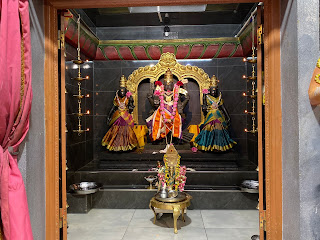Sharada Navaratri
Of the 4 Navaratris in the Hindu festival calendar, two are widely celebrated, the first one being Vasantha Navarathri that comes in spring and SriRama Navami is the 9th day of this Navaratri. Sharada Navaratri, the autumn Navaratri culminates in Vijaya Dashami. The Sharada Navaratri is devoted to the three Goddesses - MahaKali (Parvati) MahaLakshmi and MahaSaraswati, the first three days as Parvathi, the next three days as Mahalakshmi and the last three days as Saraswati. The tenth day of Sharada Navaratri is called Vijayadashami to signify the victory on the day of Dashami, this day being especially auspicious to commence new ventures, activities. For most of us, Navaratri brings memories of Golu (Bommal Koluvu), Sundal (chickpeas savoury), Kolams(Rangoli), social visits and kutcheries. Though the Navaratri has morphed into a social bonding festival, it is more an important spiritual undertaking with fasting, austerities and chanting. Golus or Bommala Koluvu (telugu) are ...


